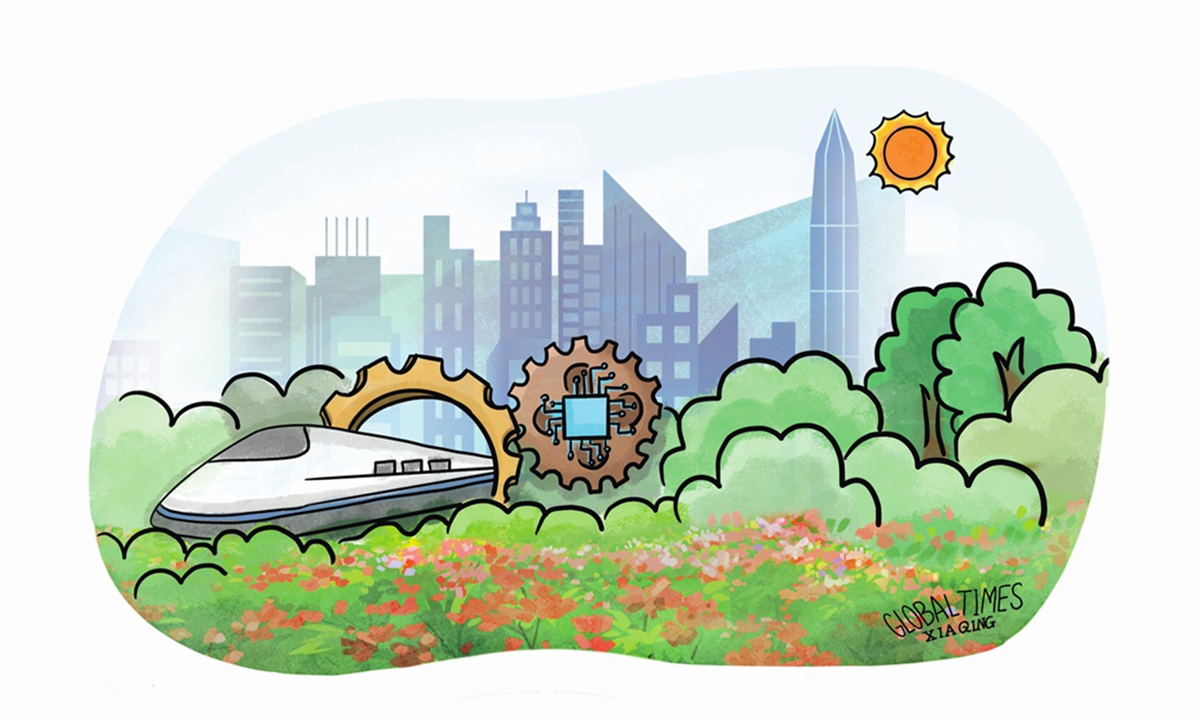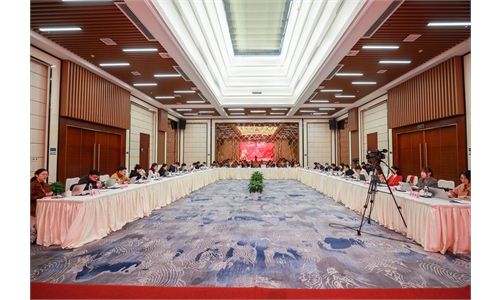Yunnan railroad proves Western colonizers never brought human rights to local people

Illustration: Xia Qing/GT
On June 14, I attended a forum on global human rights governance in Beijing. While listening to guests from nearly 100 countries discussing human rights issues, I wondered what those Western human rights experts would think of such a meeting.
For a long time, Western countries have been accusing China of human rights abuses and have even imposed sanctions against China to uphold their standards. They claim to be the judges and instructors of global human rights issues.
Who has given them such power?
It is the expansion of the West over the last few centuries, not only in terms of capital and religion, but also in ideas. In his book The Eagle's Shadow: Why America Fascinates and Infuriates the World, the American author Mark Hertsgaard writes: "The modern American empire colonizes minds, not territory."
The result is that the West has used its own discourse to fashion itself as the hegemon of the human rights pulpit. It is as if we who have been colonized are born to listen to them and to do whatever they tell us to do.
China's dramatic changes have shaken the West's position at the top of the human rights pulpit. China's development is the backbone for Chinese people to talk about human rights.
At the conference, I mentioned the history of railroads in Yunnan when I chatted with some foreign guests.
In the city of Mengzi in Yunnan, there is still a train station, called Bisezhai, built by the French.
The mottled, apricot-yellow walls give a sense of unspeakable historical vicissitudes.
Mengzi was the largest port for foreign trade in Yunnan Province in the late Qing Dynasty and the first customs office in Yunnan Province. About 40 kilometers to the southwest is Gejiu, globally known for its tin mines.
At the end of the 19th century, the French came.
In 1885, France signed a treaty with the weakened Qing government through the Sino-French War, gaining the "right of protection" over Vietnam and the right to trade and build railroads in the southwestern provinces of China.
In 1903, the French began the construction of the Yunnan-Vietnam Railway. The Yunnan section of the railroad crossed many high mountains and valleys, and each section was permeated with the blood and sweat of Chinese laborers; as the folk song of the time says, "Blood stained the Nanxi River, and corpses paved the Yunnan-Vietnam railroad."
Between 1900 and 1938, 234,242 tons of tin were transported by the French through this railroad. According to Chinese scholars, from 1915 to 1920, the Yunnan section of the French Railway Company made an average annual profit of 1 million francs, which increased to an average yearly gain of more than 6 million francs from 1920 to 1930.
What did the people of Yunnan get? It was more poverty and backwardness. The colonizers never brought any human rights to the colonized.
We do not deny that they finally made progress in human rights, but the wealth was transformed into a driving force for their development long before they found their conscience.
It was progress based on the brutal exploitation and plunder of the colonized people. Nowadays, we cannot explore modern human rights theory without thinking about the original intention of the West. It can be said that without the bloody plunder and war, there would be no modern Western theory of human rights.
If you look at the railroad system in Yunnan today, you will understand the importance of "original intentions." Western colonists' original intentions fundamentally differ from the development of railroads in China today.
China is making progress in human rights based on peaceful development. This is also something that Western theories cannot explain.
If we look back on history, then whose experience is more valuable?
My story about Yunnan's railroads still needs to be finished. Today Yunnan has become a significant railroad province in China, creating the conditions for the people of Yunnan to enjoy better human rights. It is an important tool for them to achieve an enhanced and happy life.
I suggest that foreign guests take a chance to visit there by high-speed rail or move the forum to Mengzi. After tasting the history of the old French railroads in Bisezhai, they can take the China-Laos High-Speed Rail to Vientiane. I am sure they will understand why the Chinese are now most qualified to talk about human rights.
The author is a senior editor with the People's Daily and currently a senior fellow with the Chongyang Institute for Financial Studies at Renmin University of China. dinggang@globaltimes.com.cn. Follow him on Twitter @dinggangchina


